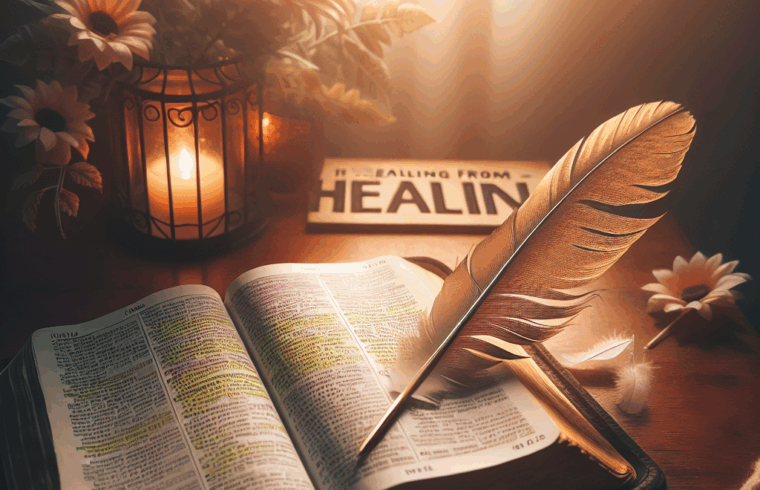==> Thank you for reading this post! Click Here If you are looking for support and Victory over PTSD.
Finding Comfort in Scripture
Understanding God’s Presence
One of the first things I found when I turned to the Bible during my struggles with PTSD was a sense of comfort. The scriptures remind us that God is always by our side, even in the darkest hours. It’s like having a warm blanket on a cold night, reassuring and protective.
For instance, verses like Psalm 23 resonate deeply. The imagery of God as a shepherd provides solace, especially when I felt lost and frightened. Knowing that I wasn’t alone in my battles helped me to slowly regain my strength.
Moreover, passages that speak of God walking with us through valleys encourage us to face our fears. Every time I read them, I visualize myself walking through my struggles hand in hand with a loving God, which filled me with a new sense of hope.
Scripture as a Source of Healing
Another aspect of how the Bible aids in healing is the power of scripture. I began to see the stories of healing in the Bible not just as tales but as reminders of what is possible. These stories sparked hope in my heart, making me believe that healing could be within my reach.
The Gospels are filled with examples of Jesus healing the sick and restoring lives. Reading about these miracles, I found myself inspired to seek healing in my own life. It’s amazing how stories written thousands of years ago can still touch our hearts today and encourage us.
Additionally, integrating these stories into my daily life and mindfulness practices helped me cultivate an atmosphere of healing. I would often reflect on them during meditation, which made me feel revived and renewed.
Community and Support
The Bible encourages fellowship among believers, reminding us that we are not alone in our journeys. When I reached out to my community and shared my struggles, I found connections with others who had faced similar battles. There’s a certain strength in numbers, and leaning on one another has been a source of healing.
Church groups, Bible studies, and even casual gatherings can create safe spaces for sharing and growth. It’s comforting to know that vulnerability is met with empathy and understanding. The love and support of a community, grounded in faith, can truly uplift your spirit.
Being part of these gatherings has taught me the importance of being there for others too. When we share our burdens, we become a source of strength for one another, and that mutual support is interwoven with biblical teachings of love and kindness.
Prayer as a Healing Tool
The Power of Connection
Prayer is an integral part of my healing journey. I learned that prayer isn’t just asking for help but also building a deeper connection with God. When I pour my heart out in prayer, I feel lighter and more connected to something greater than myself.
Sometimes I would simply sit in silence, waiting for a feeling or knowing that everything would be okay. This level of communication with God provided clarity during some of my darkest thoughts and moments of despair.
Moreover, praying for others while I myself was struggling helped me shift my focus away from my pain. It reminded me of the goodness still present in the world, fostering gratitude even amidst hardship.
Biblical Affirmations
In addition to seeking connection through prayer, I found that repeating biblical affirmations during my prayer time was immensely helpful. Phrases like “I am fearfully and wonderfully made” from Psalm 139 became mantras that I could cling to during challenging times.
These affirmations gradually shaped my mindset, replacing negativity with positivity. As I integrated these powerful truths into my daily life, I found myself embracing hope rather than succumbing to despair.
Creating a habit of pairing my prayer with affirmations transformed my outlook. It’s one thing to read those words, but saying them aloud with intent can shift your spirit significantly.
Finding Peace in Solitude
Taking the time for quiet contemplation was yet another healing element I discovered in my spiritual practice. Finding a peaceful spot, whether in nature or at home, allowed me to reconnect with myself and God. Meditative prayer teaches us to embrace stillness, where we can hear a gentle whisper amidst the chaos.
During these quiet moments, I realized how profoundly the Bible speaks to those who listen. Verses about peace, such as Philippians 4:7, start to resonate deeply, helping facilitate my journey toward inner calm.
Moreover, solitude became a safe space for me to reflect on my experiences, allowing me to process emotions and articulate them to God. This practice has been pivotal in helping me understand my journey.
Embracing Forgiveness
Forgiving Yourself
One of the hardest lessons I had to grapple with was the concept of forgiveness, starting with forgiving myself. The Bible teaches us about grace and mercy, and applying these lessons to oneself can be the most challenging yet rewarding journey.
Get Support and Help with Recovery! Visit us for more Information and Support
Understanding that everyone makes mistakes and carries their burdens helped me loosen the grips of guilt I held so tightly. It’s a constant process, but each step I take toward forgiveness brings me closer to healing.
When I began to accept my journey as part of a greater story, I realized my past didn’t define my present or future. I learned that grace is a gift we deserve, and not allowing past mistakes to haunt me is crucial in pursuing peace.
Forgiving Others
Equally important is learning to forgive others who have wronged us. For a long time, I held onto anger, thinking it was justifiable. But the truth is, anger only weighs you down and prevents you from moving forward.
The Bible has many instances that emphasize the value of forgiveness, like the Lord’s Prayer, where we’re reminded to forgive our trespassers just as we’d want to be forgiven. This realization helped me regain control over my feelings and restore my peace.
Each time I actively chose forgiveness over grievances, I felt freer, and my burdens felt lighter. It’s a liberating experience, and slowly a weight gets lifted off your shoulders, providing you with the strength to rebuild.
The Gift of Reconciliation
In learning to forgive, I also stumbled upon the beautiful concept of reconciliation. It’s not always easy, but seeking to mend broken relationships can be incredibly healing. Sometimes, this involved heartfelt conversations or seeking reconciliation through prayer.
During this journey, I found that operating from love, rather than resentment, leads to healing not just for myself, but for relationships too. The Bible emphasizes unity and love, and working towards rebuilding those connections can lead to profound growth.
The effort put into reconciliation is often rewarded with renewed friendships and stronger bonds. Even if it doesn’t pan out as hoped, knowing I made the effort helps me heal and grow in ways I never imagined.
Living in the Present
Recognizing Today’s Blessings
My recovery journey encouraged me to focus on the present moment, cherishing today rather than dwelling on the past or worrying about the future. The Bible constantly reminds us about the gift of today, and learning to appreciate small joys has become a crucial part of my healing process.
Each morning, I remind myself to count my blessings. It might be a warm cup of coffee, a sunny day, or a friendly smile from a stranger—these moments carry weight, and acknowledging them helps foster a sense of gratitude.
With practice, I became more adept at living in the moment. By recognizing my blessings, I slowly learned to replace negativity with positivity, strengthening my resilience against the trials and challenges of life.
Embracing Change
Part of living in the present also revolves around embracing change, which can be scary but ultimately leads to growth. I’ve had to remind myself that change is often a part of healing, and the Bible encourages us by emphasizing God’s purpose in our lives.
Reflecting on stories of transformation and renewal served as a beacon of hope during my struggles. It reminded me that, just as seasons change, so can our lives, bringing new opportunities and experiences.
Learning to accept change with an open heart has cultivated resilience in my journey of healing. It’s all about shifting perspective, learning to dance in the rain, and understanding that God is orchestrating everything for our good.
Engaging with Purpose
Finally, I found that living with purpose dramatically changes my outlook. The Bible states that we are all created with unique gifts and callings, and identifying my purpose provided a vital sense of direction.
Volunteering, helping others, or even engaging in creative outlets became expressions of my purpose. They not only provide joy and fulfillment but serve as reminders that my life has meaning, even amidst struggles.
Knowing I’m contributing to a greater mission helps mitigate the weight of my past experiences. Focusing on being a force of good has brought light back into my life, serving as a testament to the transformative power of connection and purpose.
Conclusion
My journey through PTSD has shown me the incredible healing power found in the Bible. It has been a guiding light, offering comfort, healing, and opportunities for growth. By embracing these teachings, I’ve found peace, purpose, and a deeper connection with God, which helps me navigate life’s challenges.
FAQs
- 1. How can the Bible help with PTSD?
- The Bible provides comfort, hope, and community support, which can be crucial for anyone healing from PTSD. It encourages prayer, forgiveness, and living in the present, all of which foster healing.
- 2. What role does prayer play in the healing process?
- Prayer acts as a connection to God, providing emotional release and clarity. Engaging in prayer helps individuals to express their feelings and seek peace during tough times.
- 3. Why is community support important for healing?
- Community support fosters a sense of belonging and love, crucial for healing. Sharing experiences with others who understand creates a positive environment where growth and healing can take place.
- 4. How can forgiveness be beneficial in overcoming trauma?
- Forgiveness can mitigate the burdens of anger and resentment, allowing for emotional freedom and healing. The process of forgiving oneself and others is essential for personal growth.
- 5. What is the significance of focusing on the present?
- Focusing on the present moment cultivates gratitude and appreciation for life’s little joys. It helps mitigate anxiety by reducing worries about the past or future, allowing for a more fulfilling life experience.













